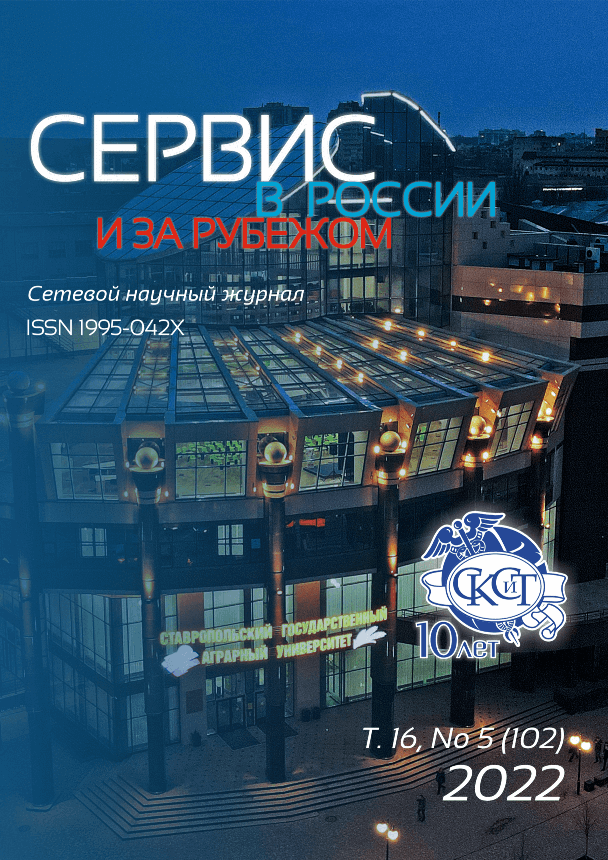Using an additive model to forecast seasonal fluctuations in the hospitality sector
DOI:
https://doi.org/10.5281/zenodo.7394162Keywords:
hospitality, seasonal fluctuations, modelling, forecasting, additive component, tour package, tourism firm, trendAbstract
The study is devoted to the modeling and forecasting seasonal fluctuations in the hospitality industry to align them in a timely manner. It will increase the level of operation of fixed assets, employment, rational use of key groups of resources and contribute to the development of measures to reduce seasonal irregularity in the studied sphere, identify socio-economic consequences of seasonality not only at the level of an individual organization, complex, region, but also the country as a whole. The model with additive component (variation of variable values in the form of trend, seasonal and random components), taking into account the data on the number of tour packages sold by travel agencies for the last fourteen quarters, is used as a basic one. The algorithm of seasonality analysis is represented by three basic steps, including calculation of seasonal component values, decrease in the seasonality factor of data and trend, and assessment of forecast accuracy. To eliminate the influence of the seasonal component, the moving average method is used, which is based on the replacement of the actual levels of the dynamic series by the estimated ones with a much smaller variation (fluctuation). In the process of the study we built models, in particular, linear, power, exponential and logarithmic ones, and selected a trend model (power model in this case), which provides the highest approximation accuracy. The constructed model allowed to determine the forecasted number of sold tour packages, taking into account seasonal and trend components. It is concluded that the study of seasonal fluctuations in hospitality on the basis of the built model will allow to develop targeted measures to eliminate or smooth the seasonality, develop sustainable demand and increase the availability of the product (service) of hospitality.
Downloads
References
Николаев С.В. Особенности фактора сезонности на деятельность субъекта индустрии гостеприимства // Транспортное дело России. 2015. №2. С. 117-121.
Константинова В.А., Мараховская Г.С. Сезонность туристского рынка и методы противостояния ей // Современные научные исследования и инновации. 2019. №12. URL: https://web.snauka.ru/issues/2019/12/90915 (Дата обращения: 10.08.2022).
Хайруллин И.Р., Подгорцева Е.Э. Альтернативы снижения рисков сезонности в туристском бизнесе // Экономические исследования и разработки. 2019. №4. С. 92-99.
Морозов М.А., Ахмятжанова А.А. Событийный туризм как инструмент выравнивания сезонности в туризме // Научно-методический электронный журнал «Концепт». 2021. URL: http://e-koncept.ru/2021/0.htm (Дата обращения: 10.08.2022).
Кондрацкая Т.А., Винокурова Д.С. Оценка сезонности в гостиничном бизнесе // Global and regional research. 2020. T.2. №4. С. 91-96.
Пилявский В.П., Павленко И.Г. Современные особенности и тенденции развития отечественной сферы гостеприимства // Вестник ОрелГИЭТ. 2017. Т.41. №3. С. 99-107.
Кильбович М.В., Гомилевская Г.А. Управление факторами сезонности в гостиничном бизнесе города Владивостока // Креативная экономика. 2020. Т.7. С. 2743-2756. DOI: 10.18334/ce.16.7.114882.
Горгорова Ю.В., Пелецкая Е.А. Учет фактора сезонности в архитектуре гостиниц Черноморского побережья Краснодарского края // Электронный научный журнал «Инженерный вестник Дона». 2020. Т.66. №6. URL: ivdon.ru/ru/magazine/archive/n6y2020/6504 (Дата обращения: 10.08.2022).
Букреев И.А., Баракина М.А. Управление финансовым состоянием туристского предприятия в условиях сезонности // Международный научный журнал «Инновационная наука». 2016. №2. С. 72-75.
Rossello J., Sanso А. Yearly, monthly and weekly seasonality of tourism demand: а decomposition analysis // Tourism Management. 2017. Vol. 60. Pp. 379-389. DOI: 10.1016/j.tourman.2016.12.019.
Duro J.A., Turrión-Prats J. Tourism seasonality worldwide // Tourism Management Perspectives. 2019. Vol.31. Pp. 38-53. DOI: 10.1016/j.tmp.2019.03.010.
Ferrante M., Lo Magno G.L., De Cantis S. Measuring tourism seasonality across European countries // Tourism Management. 2018. Vol.68. Pp. 220-235. DOI: 10.1016/j.tourman.2018.03.015.
Martín J.M., Salinas Fernandez J.A. The effects of technological improvements in the train network on tourism sustainability. An approach focused on seasonality // Sustainable Technology and Entrepreneurship. 2022. Vol.1. Iss.1. DOI: 10.1016/j.stae.2022.100005.
Wang X., Sun J., Wen H. Tourism seasonality, online user rating and hotel price: f quantitative approach based on the hedonic price model // International Journal of Hospitality Management. 2019. Vol.79. Pp. 140-147. DOI: 10.1016/j.ijhm.2019.01.007.
Fernandez-Morales A., Cisneros-Martínez J.D., McCabe S. Seasonal concentration of tourism demand: decomposition analysis and marketing implications // Tourism Management. 2016. Vol.56. Pp. 172-190. DOI: 10.1016/j.tourman.2016.04.004.
Vatsa P. Seasonality and cycles in tourism demand-redux // Annals of Tourism Research. 2021. Vol.90. DOI: 10.1016/j.annals.2020.103105.
Панова А.В. Статистика туризма. М.: ИНФРА-М, 2020. 287 с. DOI: 10.127/1371046178.
Downloads
Published
How to Cite
Issue
Section
License
Copyright (c) 2022 Polishchuk, E. A., & Hasanov, M.

This work is licensed under a Creative Commons Attribution-NonCommercial-ShareAlike 4.0 International License.












